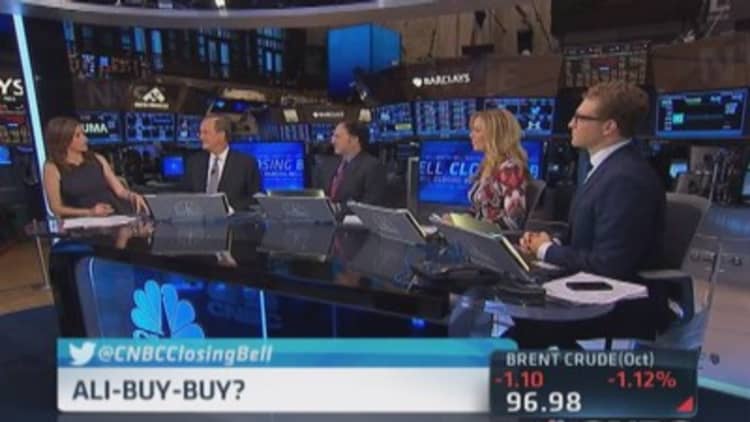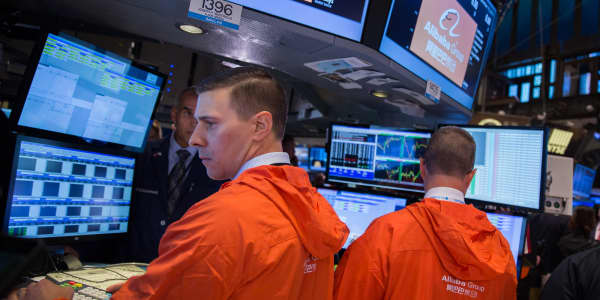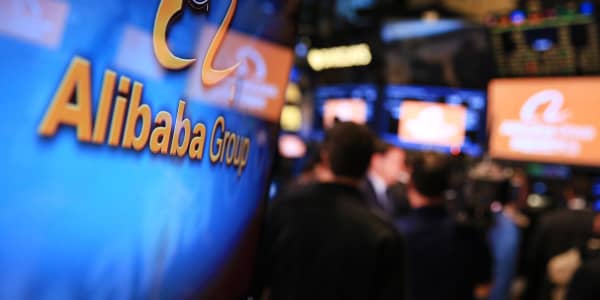Alibaba has been on an online shopping spree.
The e-commerce giant has spent over $4 billion on just four acquisitions in the first half of 2014 compared with an average of one investment per year from 2008 to 2012, not one of which was publically disclosed as being above $50 million, according to CB Insights research. 2014 is on course to be Alibaba's most active year for M&A by a wide margin, with its acquisition of mobile web developer UCWeb for $1.9 billion in June its largest reported deal to date.
Alibaba has made some 23 investments since 2013. Thus far, its investment strategy has been eclectic, causing some analysts to question management's direction.
But Bernstein, which values Alibaba at up to $85 a share, says there are few companies comparable to Alibaba in size and scope.
Read MoreSimon Xie: Jack Ma's unassuming lieutenant at Alibaba
"With so many options and opportunities, you would expect them to have investments in many areas and their fingers in many pies. So I don't see that as a major issue that is actually potentially a positive that they have so many opportunities and are pursuing them," Bernstein analyst Carlos Kirjner told CNBC.
Going mobile
Alibaba's recent acquisitions reflect the significance of mobile for future growth. Mobile accounted for 32 percent of total sales in the second quarter, up from less than 20 percent in the first.
Mobile commerce has been a point of concern for analysts who see smaller rivals such as JD.com possibly stealing a march on Alibaba when it comes to m-commerce market share.
Aside from purchasing UCWeb, Alibaba also recently invested $586 million for an 18 percent stake in Weibo, China's equivalent to Twitter. In March, it snapped up a 20 percent stake in U.S.-based messaging app TangoMe for $215 million.

Recent mobile acquisitions "not only help Alibaba discover new technologies that it may transfer to its businesses" but also "support the hypothesis that the company is making investments to acquire as much mobile consumer data as possible," Bryan Wang of Forrester Research said in a recent note.
Let Alibaba entertain you
Recent acquisitions also highlight Alibaba's digital media ambitions. Forrester suggests these investments are a bid to strengthen its ecosystem within China and find success in new markets.
To this end, Alibaba took a controlling 60 percent stake in producer ChinaVision Media in March. A month later, it purchased 16 percent of Youku Tudou, China's You Tube and sealed a $1 billion deal with digital broadcaster Wasu Media and took a controlling stake in producer ChinaVision.
Read MoreAlibaba IPO propels China Web market across the globe
While there's no doubt Alibaba has the capital to make such acquisitions, analysts have expressed concern that purchases outside e-commerce will eat into the company's margins.
"A lot of these investments they're making… they're lower margin so there's a risk to near-term margins as they're investing. So there are questions about how they're managing growth and profitability in the near-term," said Susquehanna senior analyst Brian Nowak.
Alibaba looks west
Aside for the company's substantial cash hoard, Alibaba is expected to reap after-tax profits of $8.1 billion, based on the revised IPO midpoint of $67 a share. In its latest SEC filing, Alibaba said it expects each additional dollar per share to contribute an extra $122 million in net profit.
The company expects to use the IPO funds outside China, leading analysts to speculate on where its next acquisition will be. While China-based acquisitions have accounted for 70 percent of the company's purchases, the rest have been U.S.-based.
Read MoreAlibaba draws interest from Tepper, Loeb, Cooperman
Late last year, Alibaba established a special U.S. investment squad, headed by former Liberty Media executive Michael Zeisser. Over the past year, it invested in a number of startups, including ride sharing service Lyft, ecommerce sites Shoprunner, Fanatics and 1st dibs and mobile search engine Quixey.
In June, Alibaba launched an invitation-only preview of 11 Main, its first consumer facing online retail store in the U.S.
There's no telling how these investments will move the needle on the company's top and bottom line, according to Susquehanna's Nowak: "There's nothing priced in for any material success around 11 main, or [their stake] in Shoprunner. There's no big piece of north America or ex-Asia priced in at the moment at all."
Some aren't convinced Alibaba can make it big in the U.S.
"I think competition there is a lot stiffer than it is in emerging markets, with amazon and eBay heavily entrenched. And I do expect that Alibaba would have a more difficult time getting into the U.S. market," said Jeff Dorr, Equity Analyst at J Capital Research.





